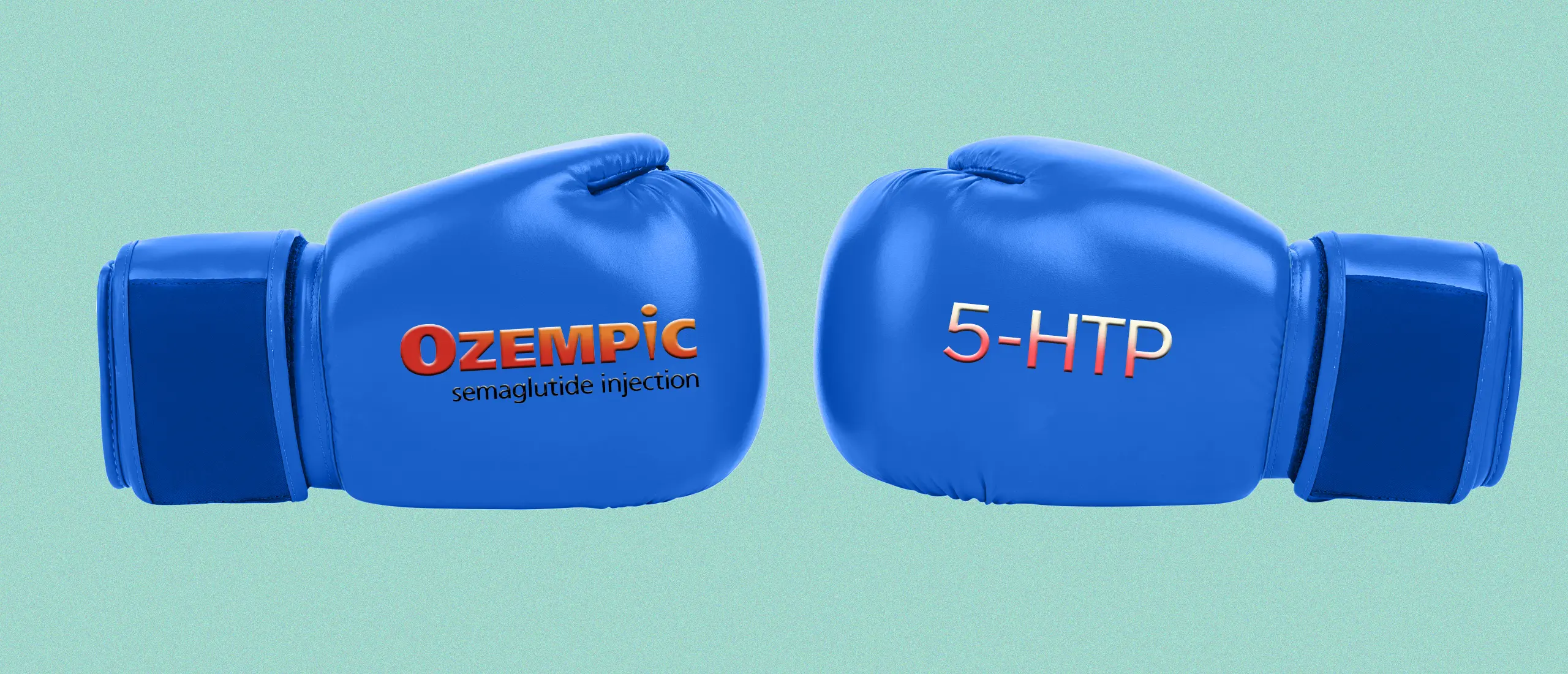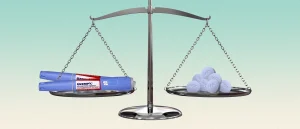Do Appetite Suppressants Work for Weight Loss?
- By Lauren Bedosky
- April 17, 2024
30-Second Takeaway
- Appetite suppressants may help you lose weight, but there’s a big difference between prescription weight loss drugs and over the counter appetite suppressants.
- To be eligible for prescription weight loss drugs that suppress appetite, you need to have a BMI of 30+ or a BMI of 27 and a weight-related health condition.
- OTC appetite suppressants typically don’t cause harm, but they’re not as effective as prescription medications.
Prescription loss drugs that make you less hungry (such as Ozempic) and supplements that claim to curb appetite saturate our news feeds. If you’ve been struggling to lose weight, you may be tempted to give one of these a shot. But do appetite suppressants work?
The answer? It depends on whether you opt for prescription or over-the-counter options.
Appetite suppressants are weight loss medications or supplements that make you feel less hungry or fuller faster after eating (1). Over time, this effect may help you consume fewer calories and shed some pounds. They’re often recommended for people who have a body mass index (BMI) of 30 or greater (a standard measurement for obesity) or a BMI of 27 or greater if the person also has weight-related health conditions, such as diabetes (2).
“Appetite suppressants work on different aspects of our hunger and satiation process,” says board-certified gastroenterologist and obesity medicine physician, Pankaj Rajvanshi, M.D. How effectively an appetite suppressant controls this process depends on its ingredients.
With so many prescription and over-the-counter appetite suppressants available online and in the pharmacy, it can be tough to separate the wheat from the chaff. Here, two doctors explain how appetite suppressants work, which ones are legit, and which ones you can skip.
About the Experts
Sarah Fishman, M.D., Ph.D., C.N.S.C., is an endocrinology, diabetes, and thyroid specialist, and the owner of Premier Endocrine in New York City.
Pankaj Rajvanshi, M.D., is a board-certified gastroenterologist and obesity medicine physician at Valley Medical Center in Renton, Washington.
How Do Appetite Suppressants Work?
The magic of appetite suppressants lies in their power to influence the systems that regulate hunger and satiety.
“The overarching problem that contributes to obesity is energy dysregulation, or the regulation of energy intake versus energy expenditure,” Rajvanshi says. There are four major players involved in appetite: the brain, pancreas, adipose tissue, and gastrointestinal (GI) tract, he notes.
Appetite suppressants target appetite-regulating chemicals in one or more of these key areas in the body. These chemicals include hormones (ghrelin, leptin, insulin, and cortisol), neurotransmitters (serotonin and gamma-aminobutyric acid), and peptides (glucagon-like peptide 1) (1). Each chemical works differently but generally makes you feel less hungry or fuller faster.
However, appetite suppressants aren’t designed as a fix-all—they often work best when combined with a healthy diet and regular physical activity. “Otherwise, when you get off the appetite suppressant, you’re going to revert to where you were before,” says endocrinology and thyroid specialist Sarah Fishman, M.D., Ph.D.
Prescription vs. Over the Counter Appetite Suppressants
There are two broad categories of appetite suppressants: Prescription and over the counter (OTC). The main difference between the two is that prescription weight loss medications have been rigorously studied. “We know how they work, their potential outcomes, what side effects they cause, who we should give them to, and who we should not,” Rajvanshi says.
For example, one clinical trial suggests that people who take a medication that targets appetite-regulating chemicals in the brain (naltrexone-bupropion, sold under the brand name Contrave) can expect to lose at least 5 percent of their body weight within 12 weeks (3). In another clinical trial, those who used semaglutide, a medication that targets hunger-producing hormones in the gut lost an average of 15.2 percent of their starting body weight over a two-year period (4).
OTC appetite suppressants, on the other hand, haven’t been studied, so we don’t know whether they work, Rajvanshi notes.
Here’s a closer look at common prescription and OTC appetite suppressants on the market.
Prescription Appetite Suppressants
Several appetite-suppressant medications have been FDA-approved and are available by prescription.
Semaglutide (Ozempic, Rybelsus, and Wegovy)
This buzzy class of medications mimics the glucagon-like peptide-1 (GLP-1) hormone released in the gut when you eat. GLP-1 tells the body to produce more insulin, reducing blood sugar, and signaling the brain you’re full.
Semaglutide is available as both an injection (Ozempic and Wegovy) and a tablet (Rybelsus). Ozempic and Rybelsus are approved for long-term use to lower blood sugar in people with type 2 diabetes and Wegovy is approved for weight loss in those with obesity or who are overweight with weight-related medical problems, such as high cholesterol and blood pressure (5).
Naltrexone-bupropion (Contrave)
Contrave is an extended-release tablet that combines a medication used to treat opioid and substance abuse disorders (naltrexone) with an antidepressant (bupropion).
Together, these medications target the hunger center and the reward system in the brain, which reduces appetite and dampens cravings (6). This medication is also designed for long-term use.
Liraglutide (Victoza and Saxenda)
Liraglutide injections help the pancreas release the appropriate amount of insulin when blood sugar rises. They also slow stomach emptying, which may decrease appetite.
Victoza is typically used to help control blood sugar in people with type 2 diabetes, whereas Saxenda is prescribed for weight loss in people with obesity or in those who are overweight with weight-related medical problems (7). Both medications can be used long-term.
Tirazepatide (Mounjaro and Zepbound)
Tirazepatide is a newer injection that works as a GLP-1 agonist, offering similar benefits as semaglutide. But it also mimics an intestinal hormone known as glucose-dependent insulinotropic polypeptide (GIP), which is known to reduce appetite. Mounjaro is currently approved for long-term treatment of type 2 diabetes while Zepbound is approved for those with obesity (or who are overweight with a weight-related medical problem) (8).
Phentermine-topiramate (Qsymia)
These capsules combine two medications: A central nervous system stimulant (phentermine) and an antiseizure drug (topiramate) (9). Together, these medications reduce your appetite and help you stay satisfied. Phentermine-topiramate is approved for long-term use (longer than 12 weeks) for people with obesity or who are overweight and have weight-related health issues (10).
Phentermine (Adipex-P and ProFast)
Phentermine is also used on its own to reduce appetite, though it’s technically only approved for short-term use (up to 12 weeks) (11). That’s because when it was first approved by the FDA for use, there wasn’t any data to suggest it’s safe for long term use (12).
PRESCRIPTION WEIGHT LOSS DRUGS
OTC appetite suppressants
There are no FDA-approved appetite suppressants available over the counter. Most OTC appetite suppressants are supplements and beverages containing natural ingredients. Here are common ingredients you’ll find in OTC appetite suppressants:
Coffee
Studies suggest that getting 192 to 526 milligrams (mg) of caffeine in coffee (about two to five and a half cups) helps suppress appetite and dampens appetite hormones (13). However, the U.S. Food and Drug Administration (FDA) suggests capping caffeine consumption at 400 mg daily, which is between four and five cups of Joe.
Green tea capsules
Green tea contains appetite-suppressing caffeine as well as a group of plant chemicals known as catechins. Research suggests that consuming 100-460 mg of catechins—specifically epigallocatechin (EGCG) in green tea—per day through green tea capsules may lead to weight loss after 12 weeks. (For reference, you’d have to drink about three cups of brewed green tea to score 300 mg of EGCG) (14).
5-HTP
5-hydroxytryptophan (5-HTP) is a compound your body makes on its own and converts to serotonin in the brain. Serotonin is a neurotransmitter that may boost satiety (15). Research around 5-HTP supporting weight loss is limited, though a few small studies have suggested taking the supplement can help you eat less by making you feel satiated faster than usual (16).
Fiber
Boosting fiber intake through fiber-rich foods has been shown to help with weight loss (17). Fiber also suppresses appetite by slowing digestion, enabling you to feel fuller for longer stretches of time.
Adding a fiber supplement like psyllium husk (a type of fiber found in products like Metamucil) may boost satiety and decrease hunger, especially if you’re cutting back on calories (18).
Are Appetite Suppressants Safe?
Prescription appetite suppressants may be safer than OTC options, as long as you follow your doctor’s orders. Prescription medications have been thoroughly studied, so doctors have a pretty good idea of what potential side effects and drug interactions to expect, Rajvanshi says.
Still, no medication is risk-free: Even when taken as directed, prescription appetite suppressants commonly cause constipation, nausea, bloating, dry mouth, and headache (19).
Meanwhile, OTC appetite suppressants aren’t regulated by the FDA. Fishman says common side effects from OTC appetite suppressants—especially those containing fiber—include bloating, diarrhea, and abdominal pain.
Something else to be mindful of is OTC appetite suppressants that contain stimulants, namely anything with caffeine. Stimulants can be habit-forming, raise your blood pressure, and lead to anxiety, Fishman says.
Who might benefit from an appetite suppressant?
Prescription appetite suppressants can be a fantastic option for people with a BMI of 30 or greater or a BMI of 27 or greater coupled with weight-related health conditions (such as high blood pressure) (2), especially if they haven’t seen weight loss from lifestyle changes such as diet and exercise.
Rajvanshi recommends getting your doctor’s opinion before trying an OTC appetite suppressant, if that’s the route you plan to go. That way, they can double check the ingredients list and let you know if there could be any risks.
Who should avoid appetite suppressants?
Appetite suppressants aren’t made for everyone.
“If you’re already a smaller person, or your weight is healthy but you cosmetically feel like you want to lose weight, I would not recommend using over the counter or prescription medications for that,” Fishman says. Instead, turn to healthy lifestyle changes for weight loss.
“If you have heart disease, stroke risk, or a seizure disorder, some of these [OTC supplements] could exacerbate or cause issues,” Rajvanshi adds. And anyone pregnant should avoid appetite suppressants altogether (2).
References
1. Cleveland Clinic. Appetite Suppressants.
2. Obesity Medicine Association. Top Weight Loss Medications.
3. Sherman Matthew, et al. (2016). Naltrexone/bupropion ER (Contrave).
4. Garvey WT, et al. (2022). Two-year effects of semaglutide in adults with overweight or obesity: the STEP 5 trial.
5. U.S. Food and Drug Administration (FDA). Medications Containing Semaglutide Marketed for Type 2 Diabetes or Weight Loss.
6. MedlinePlus. Naltrexone and Bupropion.
7. MedlinePlus. Liraglutide Injection.
8. Farzam K, et al (2023). Tirzepatide.
9. Johnson DB, et al (2023). Topiramate and Phentermine.
10. MedlinePlus. Phentermine and Topiramate.
11. Mayo Clinic. Is phentermine a good choice for weight loss?
12. Young Jin Tak, et al (2021). Long-Term Efficacy and Safety of Anti-Obesity Treatment: Where Do We Stand?
13. Schubert MM, et al (2017). Caffeine, coffee, and appetite control: a review.
14. Basu A, et al (2010). Green tea supplementation affects body weight, lipids, and lipid peroxidation in obese subjects with metabolic syndrome.
15. Voigt JP, et al (2015). Serotonin controlling feeding and satiety.
16. Mount Sinai. 5-Hydroxytryptophan (5-HTP).












